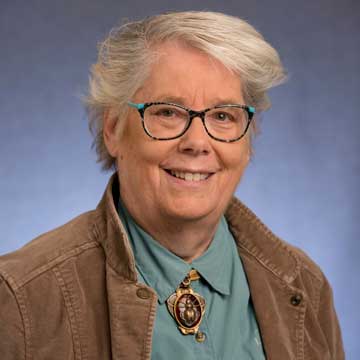Professor Woolf Elected President of the American Psychological Association
October 02, 2025

Webster University Professor Linda M. Woolf, PhD, has been elected the incoming president of the American Psychological Association (APA), it was announced this week.
APA is the largest scientific and professional organization for psychologists in the United States and one of the largest professional psychology organizations in the world. She will serve as the 2026 President-Elect and the 2027 President of APA.
In learning of her election, Woolf responded, “I am deeply honored to serve as APA’s 2027 president. Psychologists have a vital role in shaping a more just and humane world. My commitment is to amplify our collective voice in support of ethics, science, education and human dignity.”
Woolf, who holds a bachelor’s and a master’s degree from Webster, is the first Missouri psychologist to be elected as APA President.
“I am deeply honored to have been elected and humbled to join a list of leaders within psychology whose work has influenced so many fields and professions,” Woolf said. “Although I will be the first Missouri psychologist elected as APA president, I am most proud to be the first Gorlok!”
As president, Woolf promises to embody a history of visionary leadership, effective coalition-building, and strategic thinking. She said she will keep a sustained focus on diversity and interconnections, while strengthening the psychology profession to promote its global impact.
According to Woolf, “We live in a multicultural, diverse world marked by increasing connection and migration. Psychological science offers vital insights into human behavior, motivation, and decision-making, stressing the importance of cultural sensitivity and competency. Whether tackling climate change, trafficking, destructive conflict, gun violence, inequality, global public health, or refugee displacement, psychology helps identify cognitive, emotional, social, and cultural factors to inform effective, humane responses.”
These values align with her work at Webster University. As a professor with over 35 years of experience, she has taught in both Webster’s Psychology and Human Rights programs, offering courses on the Holocaust, mass political violence, human rights, ethics, peace, and international psychology. Her primary research focuses on the psychosocial roots of torture, mass violence, and genocide, but she also has worked extensively towards the integration of human rights, including women’s and LGBTQIA+ rights, and genocide/Holocaust education across the university curriculum.
Outside of Webster, Woolf has published extensively, writing articles and book chapters on topics such as hate groups, torture, LGBTQIA+ and women’s rights, psychosocial roots of genocide and terrorism, and diversity issues. She also developed curriculum materials available through the Society for the Teaching of Psychology and the American Sociological Association. In addition, she has served as an “expert” columnist for Psychology Today.
Woolf’s extensive service within APA includes two terms on APA’s Council of Representatives and service on numerous key committees. Currently serving on APA’s Ethics Code Task Force, Woolf has previously served on APA’s Commission on Ethics Processes, Committee for Global Psychology, Committee of Teachers of Psychology in Secondary Schools, Diversity Education Resources Task Force, and Work Group on "Where Faculty Live: Internationalizing the Disciplines."
Woolf is the past president of APA Divisions 2 (Society for the Teaching of Psychology) and 48 (Society for the Study of Peace, Conflict, and Violence). She has also chaired APA’s Task Force to Reconcile Policies Related to Psychologists’ Involvement in National Security Settings and co-chaired the Indigenous Apology Work Group, which produced APA’s Report on an Offer of Apology to First Peoples in the United States. Additionally, she is a member of the Institute for the Study of Genocide Board and has served on the Rafael Lemkin Book Award Committee.
Woolf holds a bachelor’s in psychology and a master’s in international relations from Webster University. She also has a master’s and a doctorate in Applied Experimental Psychology from Saint Louis University and graduated from Yad Vashem Institute—Holocaust Studies for Educators—in Israel.
The APA’s official announcement can be found online.
About the American Psychological Association:
The American Psychological Association, in Washington, D.C., is the largest scientific and professional organization representing psychology in the United States. APA’s membership includes 173,000 researchers, educators, clinicians, consultants and students. Through its divisions in 54 subfields of psychology and affiliations with 60 state, territorial and Canadian provincial associations, APA works to advance the creation, communication and application of psychological knowledge to benefit society and improve lives.
